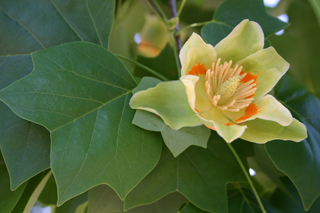Human Flower Project
Strip the Mountains, Plant a Tree
Kentucky lawmakers and coal operators like flowers and bees (not sure about mountains and people).

Flower of the tulip poplar tree (Liriodendron tuliperfera)
Photo: Arboretun, Univ. of Arkansas, Ft. Smith
Now that the creeks have been poisoned by runoff, the roads torn up by heavy trucks, the forests destroyed, and the mountains scraped flat, we are pleased to learn that Kentucky lawmakers have taken a stand on mountain-top-removal coal mining. They have passed a law that “asks” coal companies to plant pollen-producing trees and flowers on these industrial deadzones in order to feed honeybees.
Nothing against bees, but where were lawmakers when Appalachian residents demanded that this horrific form of strip mining be banned?
Rather than boring underground to mine coal, mountaintop removal blasts the surface away, shoves the non-coal down into streams, and pulls the mineral out from on top. Presto!
This method of coal mining has been fiercely opposed by local residents, who bear the brunt of its violence, and by environmentalists everywhere. Coal companies are required to file and carry out “reclamation plans” after mining, but that’s a puzzling phrase. As musician Billy Edd Wheeler wrote: “They Can’t Put It Back.”
Typically, mining companies have replanted the mangled and denuded landscape with non-native grasses. The new Kentucky law recommends that they plant, instead, pollen-producing natives, like goldenrod, asters, sourwoods, and tulip poplars. (The huge green and orange striped blooms of the tulip poplar are among the most impressive tree-flowers on the whole North American continent.)
Note: the new law is only a recommendation. Coal companies are not legally required to do anything any differently than what they have been doing. While we hope that this statute results in more nectar-producing plants in Eastern Kentucky, and healthier bee populations, it strikes us as a measly measure – a feel-good for lawmakers and a chance for the coal operators to sound environmentally sensitive. This appears to be yet another instance of floral camouflage.

Mountaintop removal/valley fill coal mining in southern West Virginia
Photo: Vivian Stockman, via OHVEC
According to Roger Alford’s report in the Richmond (KY) Register, “Kentucky Coal Association Vice President David Moss said mining companies realize the difficulties honeybees are facing nationally and that they want to find ways to help the tiny insects. Moss said the efforts of coal companies on behalf of bees contradict claims by environmentalists that mountaintop mining creates moonscapes.”
“We are officially saying that this is the farthest from the truth, that many positive things happen from reclamation, and this is another example,” Moss told Alford. The reporter also spoke with Carl Shoupe of Harlan County, who stressed that coal mining impairs the lives of many creatures, some with six-legs, others with four and two. Shoupe noted that were it not for coal mining, there would be plenty of blooming plants for bees in the mountains.
“That’s what we’ve been trying to tell everybody,” Shoupe said. “This mountaintop removal is just devastating the whole ecosystem, and no one wants to listen.”
Comments
“Shoupe noted that were it not for coal mining, there would be plenty of blooming plants for bees in the mountains.”—I could not agree more!
On a more positive note, the tulip tree is one of my favorite trees.


Access to cheap energy… The southern Appalachian mountains, home of one of the world’s richest diversities of plant species, gets stripped bare. The flower buds of the Tulip Poplar are thickening now.